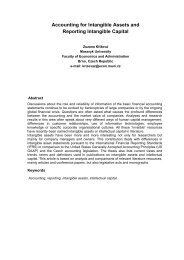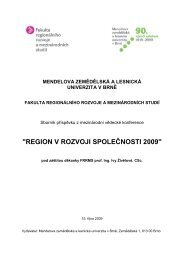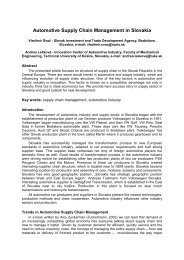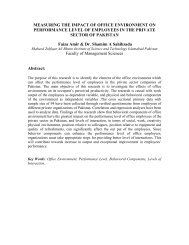performance evaluation in the hospitality industry - Icabr.com
performance evaluation in the hospitality industry - Icabr.com
performance evaluation in the hospitality industry - Icabr.com
Create successful ePaper yourself
Turn your PDF publications into a flip-book with our unique Google optimized e-Paper software.
5. Employees must be <strong>in</strong>volved <strong>in</strong> formulat<strong>in</strong>g strategies and help <strong>in</strong> identify<strong>in</strong>g<br />
<strong>the</strong> appropriate <strong>performance</strong> measures.<br />
6. The organization‟s <strong>in</strong>frastructure must encourage <strong>the</strong> desired behaviour and<br />
support <strong>the</strong> operation of <strong>the</strong> measurement system.<br />
7. Effectiveness of <strong>the</strong> system and its contribution to overall organizational<br />
<strong>performance</strong> are reviewed periodically <strong>in</strong> order to allow changes and<br />
improvements to be made where and when necessary.<br />
Performance Management, on <strong>the</strong> o<strong>the</strong>r hand, is def<strong>in</strong>ed <strong>in</strong> <strong>the</strong> landmark text by Armstrong<br />
and Baron (2004) as 'a process which contributes to <strong>the</strong> effective management of <strong>in</strong>dividuals<br />
and teams <strong>in</strong> order to achieve high levels of organisational <strong>performance</strong>. As such, it<br />
promotes <strong>the</strong> shared understand<strong>in</strong>g of what is to be achieved and an approach to lead<strong>in</strong>g<br />
and develop<strong>in</strong>g people which will ensure that it is achieved'. They go on to stress that it is 'a<br />
strategy which relates to every activity of <strong>the</strong> organisation set <strong>in</strong> <strong>the</strong> context of its human<br />
resource policies, culture, style and <strong>com</strong>munications systems.<br />
One appreciates that this classical def<strong>in</strong>ition of <strong>performance</strong> management is grounded too<br />
deeply <strong>in</strong> <strong>the</strong> humanistic or management-by-people approach whereas a systems approach<br />
would perhaps be more conducive to an objective appraisal of enterprise health by means of<br />
<strong>performance</strong> measurement that feed <strong>in</strong>to systems that almost automatically ignite Tactical<br />
Actions that keep <strong>the</strong> enterprise on course just as <strong>the</strong> booster rockets place a satellite <strong>in</strong>to<br />
earth orbit or de-orbit almost without human <strong>in</strong>tervention accord<strong>in</strong>g to a pre-fed flight-plan.<br />
Armstrong and Baron (2004) stress that, at its best, <strong>performance</strong> management is a tool to<br />
ensure that managers manage effectively and that <strong>the</strong>y ensure <strong>the</strong> people or teams <strong>the</strong>y<br />
manage:<br />
<br />
<br />
<br />
<br />
know and understand what is expected of <strong>the</strong>m<br />
have <strong>the</strong> skills and ability to deliver on <strong>the</strong>se expectations<br />
are supported by <strong>the</strong> organisation to develop <strong>the</strong> capacity to meet <strong>the</strong>se<br />
expectations and are given feedback on <strong>the</strong>ir <strong>performance</strong><br />
have <strong>the</strong> opportunity to discuss and contribute to <strong>in</strong>dividual and team aims and<br />
objectives.<br />
So <strong>performance</strong> management is about establish<strong>in</strong>g a culture <strong>in</strong> which <strong>in</strong>dividuals and groups<br />
take responsibility for <strong>the</strong> cont<strong>in</strong>uous improvement of bus<strong>in</strong>ess processes and of <strong>the</strong>ir own<br />
skills, behaviour and contributions. It is about shar<strong>in</strong>g expectations. Managers can clarify<br />
what <strong>the</strong>y expect <strong>in</strong>dividual and teams to achieve. Likewise, <strong>in</strong>dividuals and teams can<br />
<strong>com</strong>municate <strong>the</strong>ir expectations of how <strong>the</strong>y should be managed and what <strong>the</strong>y need to do<br />
<strong>the</strong>ir jobs. It follows that <strong>performance</strong> management is about <strong>in</strong>terrelationships and about<br />
improv<strong>in</strong>g <strong>the</strong> quality of relationships - between managers and <strong>in</strong>dividuals, between<br />
managers and teams, between members of teams and so on, and is <strong>the</strong>refore a jo<strong>in</strong>t<br />
process. It is also about plann<strong>in</strong>g, that is, def<strong>in</strong><strong>in</strong>g expectations expressed as objectives and<br />
<strong>in</strong> bus<strong>in</strong>ess plans. It is also about measurement. It should apply to all employees, not just<br />
managers, and to teams as much as <strong>in</strong>dividuals. It is a cont<strong>in</strong>uous process, not a one-off<br />
event. Last but not least, it is holistic and should pervade every aspect of runn<strong>in</strong>g an<br />
organisation. (Cannell, 2007).<br />
4









